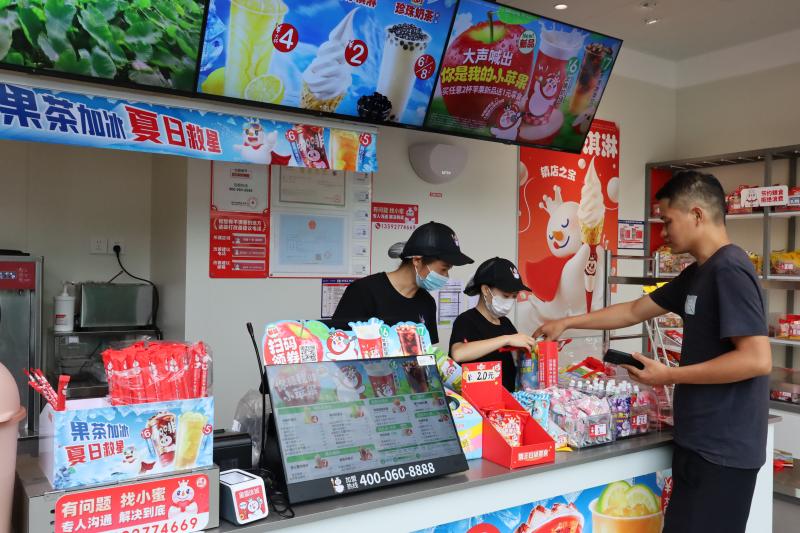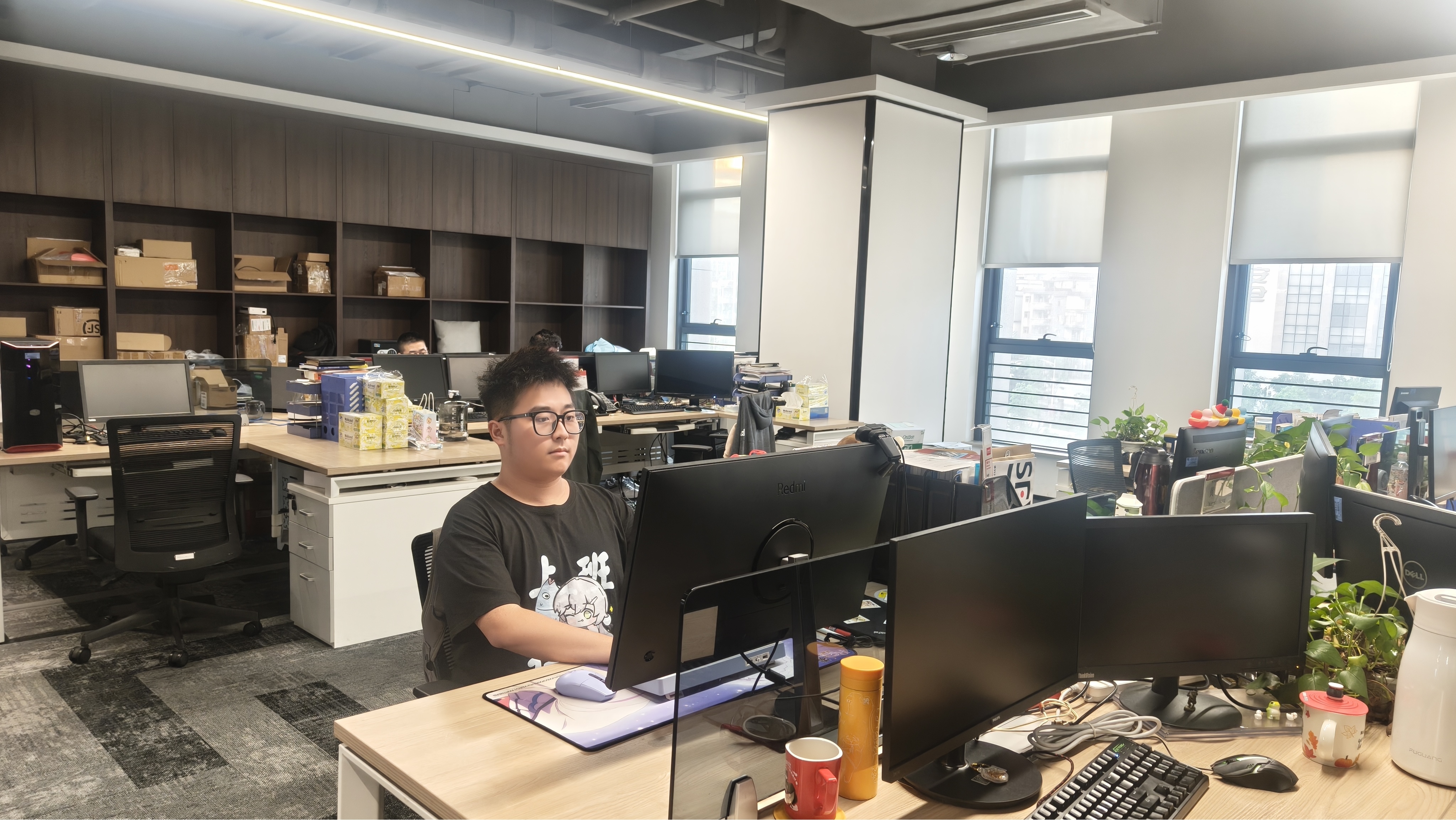Summer jobs hot like cakes
Writer: Lan Caiyou | Editor: Yu Xiyao | From: Original | Updated: 2025-08-25
When many office workers head off on long‑planned vacations to escape the “smell of the workplace” — a popular meme on Chinese social media — their desks are often taken over by bright‑eyed, energy‑filled young people. Summer is prime season for internships and part‑time stints, but finding an ideal position this year is far from easy: the job market has become intensely competitive for college students.

A college student prepares a cup of milk tea for a customer. Photo by Lan Caiyou
Ideal jobs hard to come by
Yoyo, who is about to enter her senior year at one of China’s top art universities, sent carefully edited resumes to a public museum, a university’s art center and a private cultural company in Shenzhen after spotting their openings on the institutions’ official WeChat accounts, websites or Zhipin.com, but she received no immediate reply.
A top student in her class with previous internship experience at a private museum, she considers herself “competent and suitable” for the roles. When the university art center eventually called her back, she learned the curatorial assistant positions had already been filled by earlier applicants. It could only offer a social‑media editing role, which did not greatly interest her.
“Institutions that hire interns often require two or three months of work, full‑time or at least four days a week, which deters many who also have other plans, like preparing for TOEFL or IELTS,” she said.
The National Bureau of Statistics (NBS) reported that the urban unemployment rate for 16–24‑year‑olds (excluding students) was 17.8% in July, up 3.3 percentage points from June.
The overall urban unemployment rate was 5.2% in July, up 0.2 percentage points from June. A record 12.22 million students graduated from universities this year, 430,000 more than last year. Many recent graduates who have not yet found ideal full‑time jobs are also applying for part-time work, further intensifying competition.
A survey by Xinchao.com found that most college students (57.89%) secured summer jobs or internships through family ties or friend networks, while 27.63% relied on apps like Xiaolao Zhaopin or large online job platforms such as Zhipin.com.

Zeng Hao works at Shenzhen Kaifa Technology Co., Ltd. as an algorithm engineer intern. Courtesy of Zeng Hao
This summer, Zeng Hao, a final‑year student majoring in computer science and technology, is interning at Shenzhen Kaifa Technology Co., Ltd. as an algorithm engineer.
Although algorithm engineers are generally in short supply, Zeng faced stiff competition for his internship. “I found the vacancy on an online job platform. Several master’s‑degree candidates from top universities were also at the interview, and I felt very lucky to have been chosen,” he said, adding that his confidence and communication skills may have helped.
“I treasure this opportunity because the internship experience vouches for my capability and teamwork spirit, which may help when applying for a master’s program or a future job,” he said. “I learned a lot from this experience. No one really codes the way textbooks teach; those examples are too basic and theoretical.”
Zoey Zhou, who recently completed an internship at an SDIC Securities branch in Futian District, agreed that the experience will benefit her future career. Majoring in economics at the University of London, Zhou said her parents helped her secure the internship through friends.
A taste of the grownup world
After signing an official internship contract, Zeng receives 220 yuan (US$30.6) per day, paid mid‑month like regular employees. “I deposit the money when I’m paid,” he said. “I want to pursue graduate study overseas and see the world; I also need to travel to attend conferences and tech forums. All my plans require financial investment, so I try to save every penny I can.”
Zhou, who earned considerably less than Zeng, used her internship pay to treat her parents to a lavish meal as a gesture of gratitude. She also bought items for herself and spent on hobbies.
Besides internships related to their majors, some students take summer jobs primarily to earn money. Barista roles, milk‑tea shop assistant positions and private tutoring are popular choices.
Zou, a sophomore from a junior college, works in a milk‑tea shop near his home. “It’s exhausting and I stand all day, but they pay 120 yuan daily,” he said. With that income he can buy things he enjoys or save for short trips.
“Not having to ask my parents for money gives me a sense of partial financial independence, which feels great,” Zou added. The experience has also planted a seed: he now hopes to open his own beverage shop one day. “This experience is valuable for more than just the money,” he said.
Liu, a Chinese language major at Shenzhen University, chose a traditional student part‑time job — tutoring a primary‑school boy with his summer homework. Liu is paid 200 yuan for a two‑hour session each day.
“Chinese language majors may choose teaching in primary schools as a future career, so this job prepares me for that possibility,” she said, noting that working with young children requires patience and effort. “You have to be strict sometimes, but you also need to let them have their way occasionally. Children need to feel liked and respected to cooperate.”
Beyond gaining financial independence, internships also prompt students to reflect on workplace behavior and relationships. Zhou said the experience taught her to be more cautious. “I have to think twice before I speak or move when I’m in the office,” she said.
She thinks that workplace communication and personal conduct require extra care. Zeng shared the sentiment. “At university we’re buddies with most classmates, even though we compete in exams or sports. In the workplace you must manage many types of relationships — with co‑workers and bosses,” he said. With performance systems like KPI (key performance indicators) or OKR (objectives and key results), everyone works hard and can unconsciously see others as rivals.
Despite the initial stress, Zeng said he gradually adapted to the office atmosphere and grew more confident. “It’s a learning process,” he said. “You need to observe and try to understand the power structure within your organization. Then you’ll find an appropriate position and your own voice and style.” He acknowledged that his extroverted nature may have made adaptation easier.
Looking ahead, Yoyo said she will continue searching for internships when she returns to campus in September. “I’ve already seen a museum recruitment post in the city where my university is; they allow a more flexible schedule,” she said, adding that her academic work remains her priority.